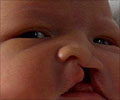Vitamin supplementation during pregnancy could prevent hydrocephalus, a common birth brain defect.
Vitamin supplementation during pregnancy could prevent hydrocephalus, a common birth brain defect.
Tests on rats showed a combination of folates dramatically reduced the rates of hydrocephalus - in which fluids build up in the brain's chambers.Most of those with the condition have impaired mental and physical ability, although the effects can vary widely.
In the UK experiments, the folates seemed to work even after the condition had started to develop.
But the work, published in the Journal of Neuropathology and Experimental Neurology, is still at an early stage.
The team from the universities of Manchester and Lancaster hope to get permission to start clinical trials in pregnant women with babies diagnosed with hydrocephalus.
The supplement itself is not currently available, so they are also seeking the support of a pharmaceutical company willing to produce it as a pill.
Advertisement
However, shunts are permanent and prone to infection and blockage, which means patients may require several operations during their lifetime.
Advertisement
Lead researcher Jaleel Miyan said: "Cerebrospinal fluid is not a liquid which simply cushions the brain and carries chemicals around it. It is actively produced and transported and plays an essential biological role in developing the brain".
The combination of supplements appeared to stimulate this process.
At present women are advised to take folic acid - a synthetic substance found to prevent spina bifida - but this does not appear to promote brain cell growth in the same way as the combination.
Andrew Russell, head of the Association for Spina Bifida and Hydrocephalus, said: "Hydrocephalus can cause severe disability and learning difficulties, so the possibility of prevention through a specific vitamin supplement is exciting.
"ASBAH is helping with this ground-breaking research because many babies born with hydrocephalus today survive, but with a lifelong disability.
"However, a lot of further work is still needed to prove this approach is effective, through clinical trials.”
Dr Imogen Montague, a spokeswoman for the Royal College of Obstetricians and Gynaecologists, while welcoming the results, cautioned that extrapolating results from rats might be problematic.
“We need to know both whether it works, and whether it is safe for use in humans. Any general use would still be a long way off," she stressed.
Source-Medindia
GPL












